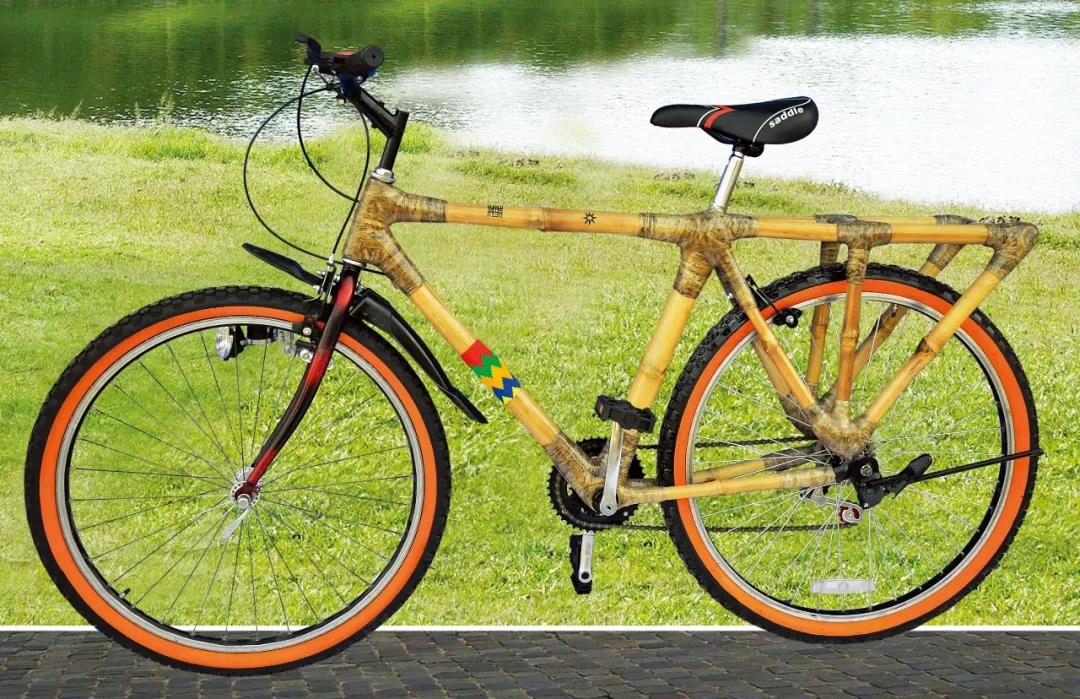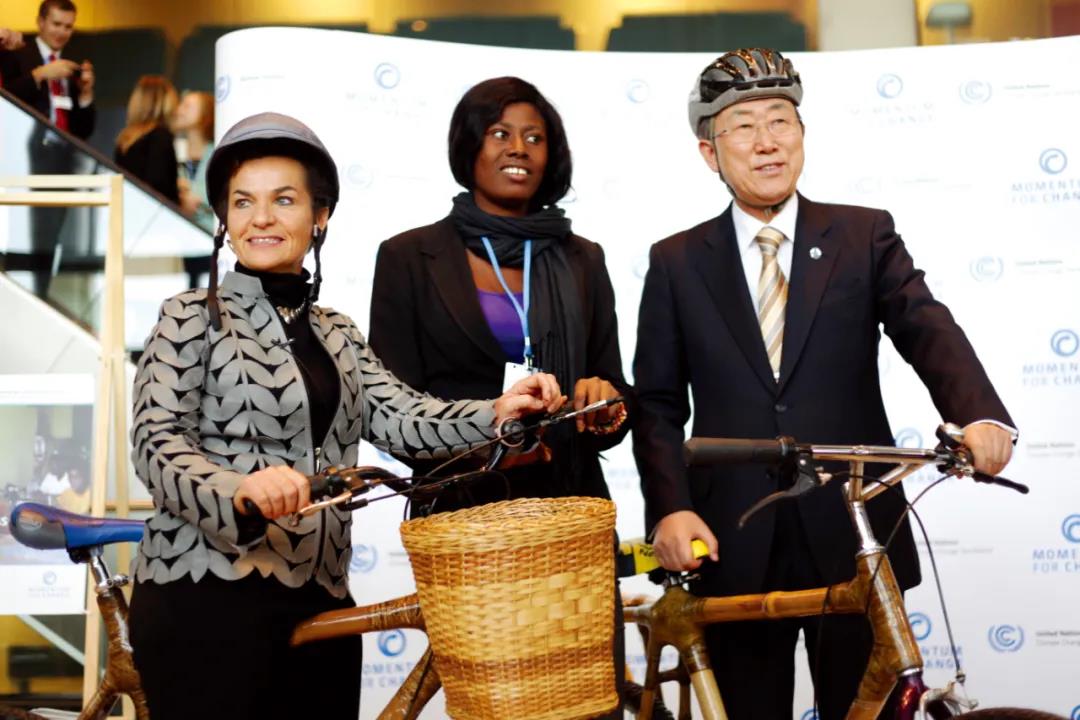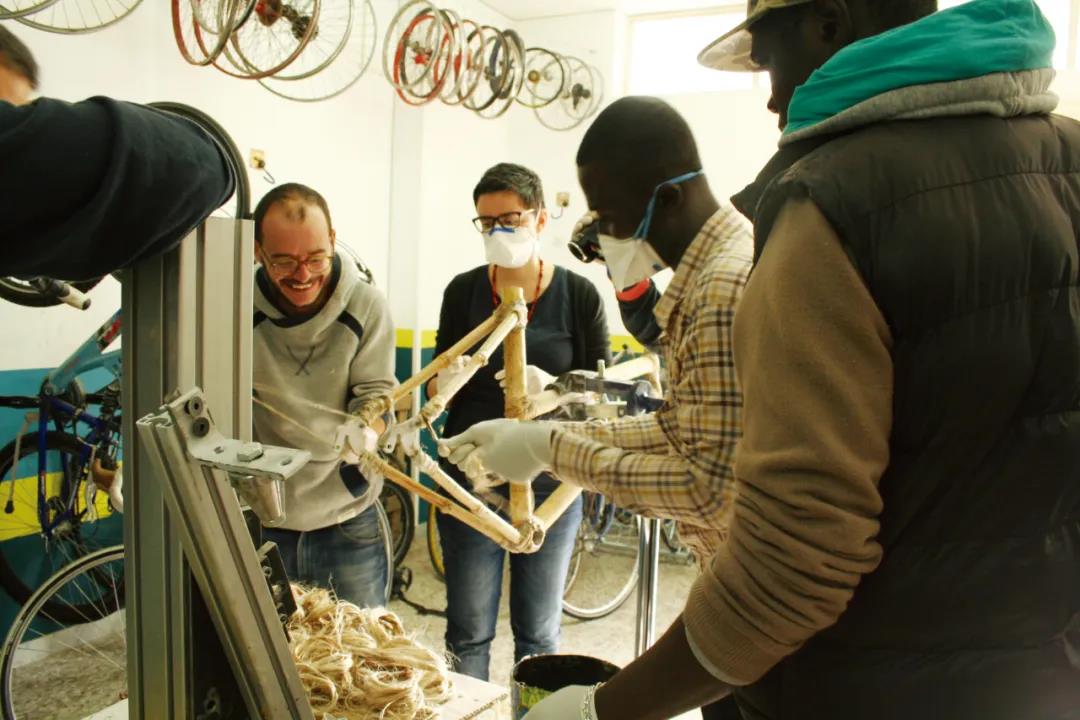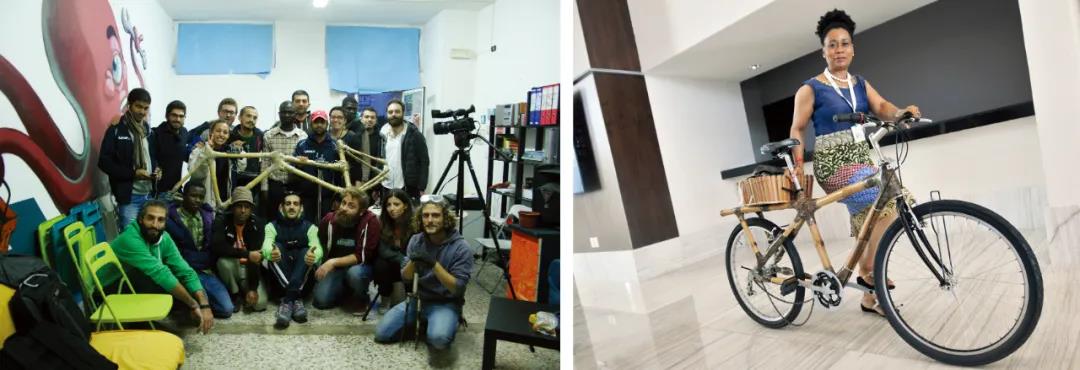


Committed to Sustainable Cities and Human Settlements for All

In Special Consultative Status with ECOSOC
Abstract: The Ghana Bamboo Bikes Initiative promotes the use of bamboo as a livelihood activity for rural development by creating employment opportunities and sustainable livelihood job skills for the youth to build multipurpose bikes that are suitable for the high terrain and purposeful for the local needs using native bamboo. Bamboo Bike frames are also exported to the international markets. It is a positive investment in the local economy helping to improve livelihood and creating jobs and contributing to deal with the triple problems of poverty, high unemployment, and environmental degradation beset many rural communities in Ghana. As a part of green economy, the Initiative supports sustainable transportation and eventually contribute positively to people and the planet.

1. Brief Introduction
The triple problems of poverty, high unemployment, and environmental degradation beset many rural communities in Ghana. One way of addressing these problems is a strategy that uses local resources, maximizes the skills of people and enables partnership throughout the value chain. Using this perspective, the Ghana Bamboo Bikes Initiative promotes the use of bamboo as a livelihood activity for rural development by creating employment opportunities and sustainable livelihood job skills for the youth as bamboo bike builders to build multipurpose bikes that are suitable for the high terrain and purposeful for the local needs using native bamboo. Bamboo Bike frames are also exported to the international markets. It is a positive investment in the local economy helping to improve livelihood and creating jobs which eventually contribute positively to people and the planet as we use local materials to support sustainable transportation.
Bicycles
generally represent the best mode of transport for rural Ghanaians by providing
an affordable form of transportation that substantially improves mobility over
walking. It provides a green alternative to inefficient public transportation
in the urban areas as well. Moreover, bikes reduce transportation time, open
new markets for trade, allow farmers to carry their goods to markets and
improve access to social services. Our multi-purpose smart cargo bamboo
bicycles integrated with a phone charger and tubeless tires eliminates the risk
of a flat tire and the burden of costly and frequent tube repairs. Rural
dwellers with no access to electricity are able to charge their phones whiles
riding their bikes and put an end to challenges faced by most bike users in
rural Ghana to lower the cost of their bicycle ownership and encourage safe
riding.
2. Background and development process
The Ghana Bamboo Bikes Initiative started as a commitment project of the Clinton Global Initiative University in 2010 and has evolved into a non-profit social enterprise implemented by the Bright Generation Community Foundation, a Ghanaian based non-profit committed to the economic empowerment of the youth especially young women.
Bicycles
currently available in Ghana are often of poor quality and unsuitable for local
needs. Designs have not improved in decades and are appropriate only for
personal transport on good road conditions. We empower and transfer the
technology of bamboo bike making to rural local people to manufacture
affordable multi-purpose bamboo bikes and frames, providing employment to
people who otherwise would be out of a job or below the poverty threshold.
3. Challenges during the implementation, and the effective measures that
have been taken
First of all, the major obstacle is enough funding. In our part of the world, it is very tough getting the needed financing for innovative social enterprises. Secondly, we have labour related problems: There were no existing bamboo bike builders to start with, so we have to invest in the training of highly skilled bamboo bike builders and identify alternative people who can perform the functions of the existing bamboo bike builders. The last but not least, communities have wrong perception about NGOs and are used to NGO give aways.
As such, we take corresponding measures: We explored
and continued to explore sustainable source of funding which includes selling
our products to generate income. We trained some of our bamboo bike builders
with multiple skill sets, so that they can replace other positions for a short
period of time when necessary. We have to ensure a shift from this to ensure
that the Ghana Bamboo Bikes is perceived as a business opportunity since we
operate as a non- profit social enterprise to empower rural dwellers and their
communities.

UN Secretary General Ban Kin Moon and UNFCCC
Executive Secretary Christiana Figueres trying the bamboo bikes
4. The innovations of the Practice
The idea of adding value to bamboo to address the transportation needs of rural dwellers and producing bamboo frames for international markets and using bamboo waste for making charcoal and briquettes to address the energy needs of households in the community whiles reducing indoor air pollution and restoration of already destroyed forests makes our project very innovative. The bamboo bikes design has a major advantage over that of current steel bikes: It is designed for the high terrain in rural Ghana as opposed to the imported steel bikes which are designed mainly for leisurely riding on paved roads. Additionally the frames are built as one piece including the carrier rather than as number of pieces, making them both stronger and more viable economically to consumers of bicycles who may no longer have to pay for assembly and extra parts.
The bamboo bikes can be used for personal or cargo transportation, as well as for commercial purposes, it can carry a much heavier load due to better design and greater strength. Have a better replacement rate of approximately once every five years the replacement material is locally grown, and the knowledge and tools needed for repairs are locally available. The increased cultivation and use of bamboo as an alternative to wood is helping the preservation and rehabilitation of the community’s dwindling forests and contributes positively to the health of local ecosystems.
An innovative aspect of our operations is its emphasis on combining the governance of the initiative with training opportunities for its bamboo bike builders, farmers and suppliers. Collective ownership gives bamboo bike builders and the farmers a share of its profit to progress towards better paid economic activities and a stronger voice.
Rising up the value chain through export of higher value branded finished goods(bamboo bike frames) instead of low value commodity exports(bamboo)and showing to the world that creating innovative world class products and trading them with the world is the best road to greater shared prosperity.
Our bikes can
withstand large loads, rough terrain and inclement weather and are configured
to be not only affordable, but also maintained and repaired locally. The design
can be easily modified for different purposes carrying farm loads, passengers,
water, health workers kits, and can be made suitable for women, even those
wearing long robes.
5. The green and environmental-friendly
features
Environmental: Using bamboo bike waste to manufacture charcoal briquettes not only addresses the energy needs of households but reduces indoor air pollution and helps in the restoration of already destroyed forests.
Climate Benefit: Each bamboo bicycle reduces up to five kilograms of CO2 emissions compared with standard steel models.
Social: Planted 25,000 bamboo seedlings which have removed over 37,500 kgs of CO2 to offset carbon emissions.
The increased cultivation and use of bamboo as an alternative to wood is helping the preservation and rehabilitation of the community’s dwindling forests. Bamboo helps improve air and water quality in areas where it is harvested. Its root system is constructed in such a way as to reduce soil erosion, a major concern for many farmers.
It does not leach many nutrients from the ground, as
it pulls silica from the soil. Growing bamboo helps prevent soil erosion,
purifies water and air and generates little waste. Bamboo bicycles have
positive impact on the environment in both the early and a late stage of
production while production does not use harmful chemicals. It has a number of
environmentally friendly qualities and a lower negative environmental impact
than steel bicycles. Bamboo used for bamboo bikes is not treated with the same
chemicals used for other bamboo treatment. As a result, there is no need to
dispose of chemicals, and people do not come into contact with
chemically-treated bamboo. Bamboo minimizes CO2 gases and generates
up to 35% more oxygen then equivalent stand of trees. Trees that are not cut
for the production of bike frames support the sequestration of CO2.

Amos, the head of production, is training Italian youth
6. The social benefits
The initiative is a positive investment in the local economy helping to improve livelihood and creating jobs that will contribute positively to people and the planet as we use local materials to support sustainable transportation that reduces emission in bike production process.
The initiative has created direct employment for 35 people with higher wage than most other Ghanaians. They are representing a household with an average of about 5 with the knock on effect of about 175 people benefiting directly. These beneficiaries manage income effectively and are free from hunger and improved housing with their participating families fed, schooled and house sufficiently resulting in increased standard of living and quality of life. The higher incomes have translated into improvements in community health and education.
By empowering rural dwellers and young people, the initiative has profound impacts not only on its bamboo bike builders lives, but on the wider community. The youth are central agents of change in key development issues in the community including food security, HIV/AIDS, poverty reduction and democratic governance. By empowering these rural youth to earn a sustainable income greater than wages of most Ghanaians in similar industries, the initiative is delivering multiple development dividends.
The initiative has provided a once economically
marginalized group of rural youth with much higher incomes, a degree of
financial autonomy, and a greater role in resource governance and
decision-making. The opportunity to engage in training and capacity building,
and to take on positions of responsibility within the initiative, has enabled
the bamboo bike builders to raise their status within their respective
communities. As a result, the bamboo bike builders have reported that their
self-confidence and self-esteem have risen.

Amos training Italian youth (left) and Kemi on her bamboo bike (right)
7. The inspiration to other cities
From the very onset of our intervention, mechanisms have been put in place to ensure that the bamboo bicycle production will be a sustainable community based social enterprise.
This includes putting in a well dedicated and committed team of professionals who are passionate about the transformation of this vision into reality. This team envisions the project as neither charity nor experiment but a growth centric and self sustainable model benefitting all the stakeholders.
The honors/awards received
2014 UN
Habitat/Dubai International Best Practice Award
Global
Human Settlements Award 2014-Global Best Practice of Green Mobility
AFD 100
Innovations for Sustainable Development Award 2013
UNFCCC
Momentum For Change Lighthouse Activity Award 2013
World
Business and Development Award Winner 2012
Samsung/Generations
For Peace Award Winner 2012
2012 UN
Habitat/Dubai International Best Practice
2nd Runner
Up 2012 International Road Federation InARoad Awards
GIZ Impact
Business Award Winner 2011
ImagineNations
Global Business Plan Competition Award Winner 2011
Rockefeller
Foundation featured The Ghana Bamboo Bikes (GBBI) as part of the International
Women's Day Celebration.
GBBI have been featured several times on various multimedia worldwide prominent amongst them are Deutsche Welle, CNN, BBC, Huffington Post, UN.
Copyright © Global Forum on Human Settlements (GFHS)
